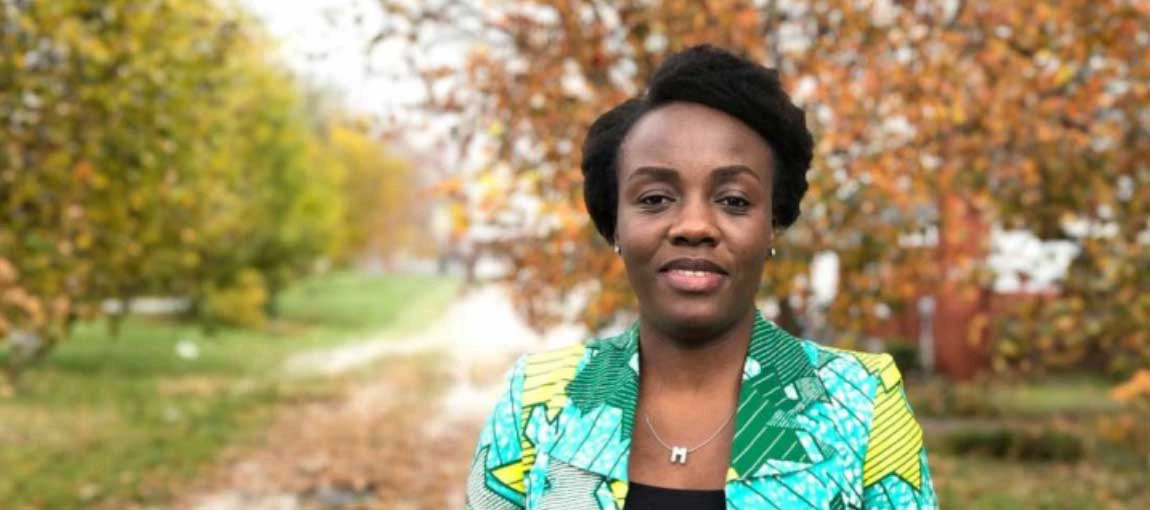 Marina Mavungu Ngoma was a World Bank Africa Fellow in 2022. We caught up with her to check in on the fellowship experience.
Marina Mavungu Ngoma was a World Bank Africa Fellow in 2022. We caught up with her to check in on the fellowship experience.
For Women's History Month, we met with Marina Mavungu Ngoma, a Congolese Economist and Young Professional at the World Bank, and one of the 2022 fellows in the World Bank Group Africa Fellowship Program. This program supports African scholars who are working on or have recently finished their Ph.D. studies. Selected fellows have six-month assignments to World Bank offices, gaining hands-on experience in policy, research, and institution-building, all geared toward reducing poverty and fostering inclusive growth.
We asked Marina to share her journey and what drove her to pursue the Africa Fellowship Program. Her answers will perhaps inspire other female scholars to apply!
What drove you to apply for the Africa Fellowship Program?
Definitely, my desire to gain firsthand insight into how the World Bank works, being the largest development institution globally. I am passionate about connecting academic research with its practical implications for policymaking and implementation. I wanted to deepen my understanding of the most pressing development issues, particularly in areas of structural transformation in developing and emerging economies, and to learn about the World Bank’s approaches to addressing them. The Office of the Chief Economist in the Africa Region (AFRCE), known for producing knowledge and insights on development challenges and policy and institutional reforms in Sub-Saharan Africa, was the ideal place for me to achieve this.
What was your experience as a fellow? Any standout success moments or challenges?
My fellowship experience provided a valuable opportunity to engage with the continent’s policy challenges and to familiarize myself with the AFRCE’s policy and research agenda, particularly in areas of firm development, structural transformation, and trade. I embarked on examining various topics, such as (i) the trade-offs governments encounter when supporting firms of different sizes, vulnerabilities, and economic impacts; (ii) the macroeconomic challenges Ethiopian firms face in international trade, particularly issues related to accessing foreign exchange; and (iii) the influence of trade on market dynamics and competition. Furthermore, the workshops organized by the program offered a valuable platform for discussion and delivered constructive feedback on the work we Fellows were doing.
One standout useful aspect of the program was the mentorship I received from my supervisor and the Chief Economist, including the guidance they provided as I considered my career options post-fellowship and graduate school. Their support throughout the program was immensely helpful, and I am grateful for the opportunity to learn from them. The fellowship facilitated networking with World Bank staff, and connecting with other talented Africa fellows from diverse backgrounds was inspiring.
The biggest challenge I faced was balancing the fellowship with completing my PhD and navigating the job market for economists, which follows a standard timeline for graduating PhD candidates. This limited my ability to fully immerse myself in the program and connect with fellow participants as much as I would have liked. However, despite these constraints, the fellowship was rewarding, offering mentorship, insights into the World Bank’s work, and networking opportunities that have been beneficial for my professional journey.
As a woman in the Africa Fellowship Program, how do you see women’s role in shaping African development agendas, and how does this program support that?
According to a recent report by the African Development Bank, African women contribute significantly to the GDP of the continent, standing out for their economic engagement, particularly in farming and entrepreneurship. Yet, they face significant barriers such as restrictive cultural norms, discriminatory laws, and limited access to education. These barriers not only hinder their full economic participation but also result in their underrepresentation across many other areas. Targeted policies aimed at enhancing their economic role and reducing the gender gap could empower women and also stimulate Africa’s economic development.
The Africa Fellowship Program is commendable for its commitment to providing equal opportunities to all participants, regardless of gender, thereby opening doors for women to excel. By focusing on Africans pursuing PhD studies, the program encourages young Africans, including women, to pursue higher education. Importantly, the program empowers women by offering them a platform to learn and grow in their professional journey and to engage in and influence the policies shaping Africa's future. This effort goes a long way to broaden the opportunities for women to assume technical and leadership roles, where their representation is urgently needed.
During my Fellowship journey, I have had the privilege of working alongside exceptional women who have demonstrated outstanding work in their respective fields. Many of them are now pursuing exciting career opportunities, thanks to the doors opened by the Fellowship.


Join the Conversation